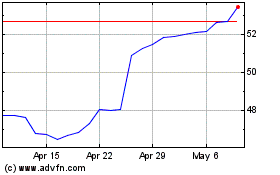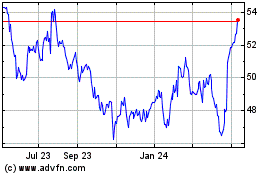Dollar Shave Club's $1 Billion Deal: A Victory for Simplicity Over Technology
July 20 2016 - 4:28PM
Dow Jones News
By Sharon Terlep
Unilever PLC's decision to pay $1 billion for the
trendy-but-unprofitable Dollar Shave Club Inc. is evidence that
simple, low-price razors have upended a global business long-built
on adding blades and raising prices.
"To say we didn't come out of the gate with a bull's-eye on
Gillette would be disingenuous," Michael Dubin, the 37-year-old
founder and chief executive of Dollar Shave Club, said in a recent
interview.
Dollar Shave Club, which has 190 employees, doesn't make any of
the products it sells. Unlike market leader Gillette, owned by
Procter & Gamble Co., which has 110,000 employees and uses 18
factories around the globe for its grooming products, the Venice,
Calif., startup shook up the razor market with a direct-to-consumer
model. It signs up customers with clever online marketing and low
prices, and relies on third parties to manufacture its
products.
"We can't help but wonder if this is a bold statement that
technology and product quality has reached a level where it is
doesn't matter as much as channel and business model," Barclay's
analyst Lauren Lieberman wrote in a note.
Now, the upstart will be backed by the deep pockets and vast
scale of Unilever, a European consumer-products giant with annual
sales of nearly $59 billion. The deal also gives Unilever, whose
brands include Dove soaps, Ben & Jerry's ice cream and Lipton
tea, entry to the razor business, adding a formidable rival for
Gillette and Schick, owned by Edgewell Personal Care Co.
P&G fought back with its own Gillette Shave Club, which it
unveiled in 2014, but has failed to stem a lengthy market-share
decline that accelerated when Dollar Shave Club and other online
razor services like Harry's Inc. came on the scene. Gillette
commanded about 59% of the U.S. men's razor and blades business
last year, down from 71% in 2010, according to Euromonitor. P&G
had no immediate comment.
Sales for P&G's grooming division, which includes razors and
blades, fell 10% to $1.6 billion in the most recent quarter despite
price increases, as volume declined by 6%. Sales for Edgewell's
shaving division slumped 5.1% in the first three months of the
year, and profit for the segment tumbled 22%.
P&G has invested heavily over the years in high-tech
offerings with ever-higher prices, such as its five-bladed Fusion
and the FlexBall handle. But greater acceptance of stubble in the
workplace and a shift to online shopping has made those devices a
tougher sell. Dollar Shave Club focused on selling disposable
blades that cost between $1 and $9 a month, and saved shoppers a
trip to the store.
The four-year-old service has been popular -- attracting 3.2
million subscribers -- but has also been unprofitable. Dollar Shave
Club has been losing money as it spends heavily to attract new
customers and market new products, people familiar with the company
said. The company had revenue of $152 million last year and is on
track to exceed $200 million in 2016, according to Unilever.
It is unclear whether Dollar Shave Club would have continued to
thrive on its own. Barclays's Ms. Lieberman estimates Dollar Shave
Club has a dropout rate around 25% and said the company could use
more marketing heft to improve the numbers.
Mr. Dubin said he was talking with Unilever about an investment
before deciding to sell the business. The company was in talks with
potential investors in part because it realized it needed
additional funds to continue its expansion and branch out into
other regions and categories, according to one person familiar with
the matter. Another person familiar with the company said it was on
track to turn a profit in the fourth quarter.
The deal also leaves Edgewell -- which also owns Wet Ones wipes
and Banana Boat sunscreen -- out in the cold. Wall Street viewed
the company, which has also lost share in recent years, as a prime
target for Unilever. It is possible Unilever could still attempt to
acquire Edgewell, which has a market value of about $5 billion,
though analysts said the move now seems less likely.
"This was a smart tactical move by Unilever in that it puts up
barriers to others who might want to acquire [Edgewell] while
leaving it as an option to come back to and build scale," Bernstein
Research analyst Ali Dibadj wrote in a note.
Shares of Edgewell dipped 1.5% Wednesday, while P&G's shares
slipped 0.3%.
In addition to Gillette and Schick, the company faces
competition from Harry's, which has raised more than $375 million
in venture capital and debt financing, in part to purchase and
expand the German-based factory where it makes its razors. A
funding round last summer valued Harry's at $750 million, according
to people familiar with the deal.
Rolfe Winkler and Paul Ziobro contributed to this article.
Write to Sharon Terlep at sharon.terlep@wsj.com
(END) Dow Jones Newswires
July 20, 2016 16:13 ET (20:13 GMT)
Copyright (c) 2016 Dow Jones & Company, Inc.
Unilever (NYSE:UL)
Historical Stock Chart
From Mar 2024 to Apr 2024

Unilever (NYSE:UL)
Historical Stock Chart
From Apr 2023 to Apr 2024
